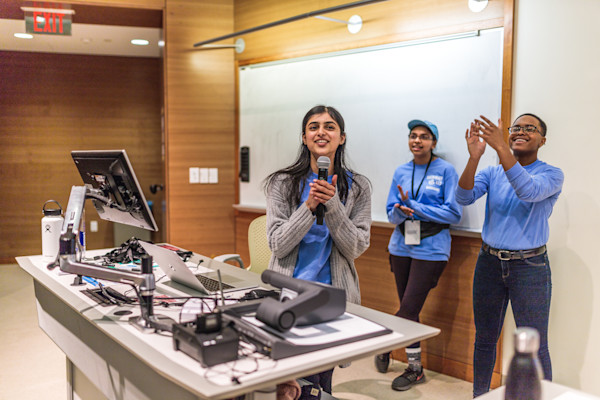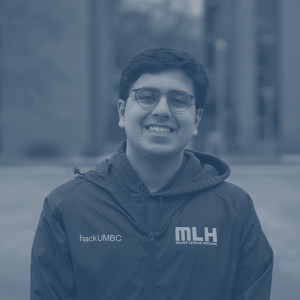Disha Srivastava, 21

As Disha entered her first hackathon, Los Altos Hacks II, she and her teammate were both excited to bring their first original project to the table. Taking place around the time of the unfolding refugee crisis in Aleppo, Disha hoped to work on a project that would raise awareness of the humanitarian crisis. With this goal in mind and with the help of their mentors, the pair attempted to create a web-based game that would gamify the struggles experienced by the civilians of Aleppo, aiming to raise awareness for the urgency for humanitarian relief.
The project came with its share of struggles, resulting in an imperfect prototype. Even though the project wasn’t an immediate success, Disha was left with inspiration from the immense power of technology to educate individuals on current events and social issues which demand unity.
Disha brought this budding inspiration to future hackathons, where she worked on her favorite project, DeepCheck. It worked as a proof of concept of how vitriolic social media activity might be discovered through machine intelligence to be evaluated by law enforcement officials to complement or augment accepted background checks for firearm licenses. She and her teammate utilized the power of sentiment analysis and web development to allow for more robust background checks surrounding firearm purchases. DeepCheck won ‘Best Use of Human-Centered AI’ from Underscore VC, and even saw room for development at other events. The potential future that DeepCheck left Disha and her team with gave them something to hold close to their hearts.
As a woman in tech, Disha has taken part in founding two hackathons with the goal of female empowerment: Superposition and Hack(H)er413. These events became the first hackathons entirely constituted of women and non-binary folks in both the San Francisco Bay Area and Western Massachusetts. Moments like this that create a safe space for women and non-binary hackers to explore technology and build community are the reasons why Disha finds the path of technology for social good so fulfilling. And she’s taken it even further as the Director of Hack(H)er413’s second annual hackathon. She successfully raised over $100k+ for women-empowering hackathons, which has enabled events to provide day-of resources and the opportunities for hackers to learn about career options directly from sponsors.
With such a wide variety of social issues addressed in her projects, Disha has learned how much of an impact technology has on social change. Every discipline has the potential for growth with the aid of technology as long as a passionate hacker mines that specific technology to the greatest of their ability. She cites the collaborative environment of hackathon arenas as a part of the great passion that she has for combining her deepest interests in social good and tech. Now manifesting this passion beyond creating projects to organize hackathons, Disha has made lifelong friends with her wide network of fellow eager hackers.
Working on a hackathon project requires each team member to wear multiple hats of different specializations, which means Disha is familiar with the task of balancing development, design, and working towards a multilateral goal. This layered process paired with an interest in the intersection of tech and business-led Disha to understand that the hat she wears best is product management.
At TechTogether Boston, while working on DeepCheck, she learned the importance of constantly considering user interest when working on the web platform to display the results of the team’s machine learning model. At #BattleoftheCamps, while working on GeoTool, she learned how to ideate features and project ideas that stemmed from one overarching mission. Keeping goals such as this in mind guide a range of processes from ideation, to design, to development, to presentation. These steps, along with the time crunch of a hackathon, have prepared her for any future career path.
Through hackathon participation and volunteer efforts as an organizer in her four years in tech, Disha’s path has been deeply rooted in fighting for social change and equality. Her projects, like DeepCheck, are examples of the care she puts into increasing the safety of the everyday life of individuals. As an organizer, she has empowered gender minorities in the tech industry across multiple states. She’s grateful to have been given the opportunity to make her mark in these ways, and she hopes to return to local hackathons as a sponsor in the following years in order to give back and empower participants to hack for the common good.
Quick Facts

Disha Srivastava, 21

As Disha entered her first hackathon, Los Altos Hacks II, she and her teammate were both excited to bring their first original project to the table. Taking place around the time of the unfolding refugee crisis in Aleppo, Disha hoped to work on a project that would raise awareness of the humanitarian crisis. With this goal in mind and with the help of their mentors, the pair attempted to create a web-based game that would gamify the struggles experienced by the civilians of Aleppo, aiming to raise awareness for the urgency for humanitarian relief.
The project came with its share of struggles, resulting in an imperfect prototype. Even though the project wasn’t an immediate success, Disha was left with inspiration from the immense power of technology to educate individuals on current events and social issues which demand unity.
Disha brought this budding inspiration to future hackathons, where she worked on her favorite project, DeepCheck. It worked as a proof of concept of how vitriolic social media activity might be discovered through machine intelligence to be evaluated by law enforcement officials to complement or augment accepted background checks for firearm licenses. She and her teammate utilized the power of sentiment analysis and web development to allow for more robust background checks surrounding firearm purchases. DeepCheck won ‘Best Use of Human-Centered AI’ from Underscore VC, and even saw room for development at other events. The potential future that DeepCheck left Disha and her team with gave them something to hold close to their hearts.
As a woman in tech, Disha has taken part in founding two hackathons with the goal of female empowerment: Superposition and Hack(H)er413. These events became the first hackathons entirely constituted of women and non-binary folks in both the San Francisco Bay Area and Western Massachusetts. Moments like this that create a safe space for women and non-binary hackers to explore technology and build community are the reasons why Disha finds the path of technology for social good so fulfilling. And she’s taken it even further as the Director of Hack(H)er413’s second annual hackathon. She successfully raised over $100k+ for women-empowering hackathons, which has enabled events to provide day-of resources and the opportunities for hackers to learn about career options directly from sponsors.
With such a wide variety of social issues addressed in her projects, Disha has learned how much of an impact technology has on social change. Every discipline has the potential for growth with the aid of technology as long as a passionate hacker mines that specific technology to the greatest of their ability. She cites the collaborative environment of hackathon arenas as a part of the great passion that she has for combining her deepest interests in social good and tech. Now manifesting this passion beyond creating projects to organize hackathons, Disha has made lifelong friends with her wide network of fellow eager hackers.
Working on a hackathon project requires each team member to wear multiple hats of different specializations, which means Disha is familiar with the task of balancing development, design, and working towards a multilateral goal. This layered process paired with an interest in the intersection of tech and business-led Disha to understand that the hat she wears best is product management.
At TechTogether Boston, while working on DeepCheck, she learned the importance of constantly considering user interest when working on the web platform to display the results of the team’s machine learning model. At #BattleoftheCamps, while working on GeoTool, she learned how to ideate features and project ideas that stemmed from one overarching mission. Keeping goals such as this in mind guide a range of processes from ideation, to design, to development, to presentation. These steps, along with the time crunch of a hackathon, have prepared her for any future career path.
Through hackathon participation and volunteer efforts as an organizer in her four years in tech, Disha’s path has been deeply rooted in fighting for social change and equality. Her projects, like DeepCheck, are examples of the care she puts into increasing the safety of the everyday life of individuals. As an organizer, she has empowered gender minorities in the tech industry across multiple states. She’s grateful to have been given the opportunity to make her mark in these ways, and she hopes to return to local hackathons as a sponsor in the following years in order to give back and empower participants to hack for the common good.
Quick Facts




